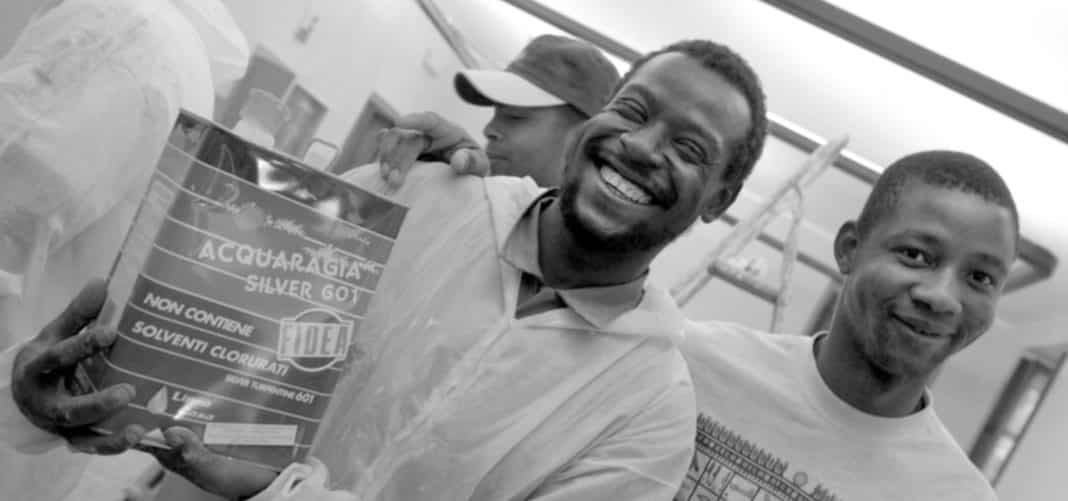History, objectives and results of two projects able to connect tradition and social sustainability.
Villa Quaglina is the ex Priesthood Oblati of San Giuseppe in Asti. A beautiful last century villa immersed in the greenery, with a farmhouse and a six hectares park of cultivable land, no used for years.
In 2014, CO.AL.A. Consortium and Piam Onlus, give rising to this compound, starting the activity of hosting refugees. It is in this context, starting from the hosting, that it is born and developed the project to enhance and preserve the Piedmont agri-food excellence.
Give back a connection with the land to who has lost it.
In Canelli and Asti, two virtuous experience of agricultural holdings based on the work of migrants and asylum seekers.
by Gabriele Rosso
Leave the earth that you have seen grow, where the roots have dug deep and the affections are interwoven even to the grass roots – at least where the grass grows – is a somewhat destabilizing experience. It is what happens every day to hundreds, often thousands, migrants fleeing from the poorest and most disheartened countries in the world. The phenomenon has become so great that there is now, and it is evident, a time of escape, of vagar on the sea or on mainland, of living by transplanting into a new country: we see it happen every day in front of our eyes, on tv , in pictures taken by photoreporter, on the web.
What we can’t see, or we are struggling to understand, is how the land of migrants, perhaps even more than theirs sailing, is the real signal of the eradication. They arrived in a place they don’t understand, that often watching it with mistrust. It’s a subtle form of violence. It’s the realization of the man without a country, that will never feel safe and protected by the familiarity of the context which surrounds it.
Here, in that situation takes an extraordinary value the whole speech about the food and the agriculture. Because about the fact that what we put into mouth and the relationship with the earth are the basis of our filling at home, there are few doubts. And that’s why Slow Food, and in general who sees in the food and in the agricultural powerful and efficient tools for integration and rootlessness, pays attention for years also to the phenomenon of migration and to the help for the underdeveloped countries.
Obliviously, the Africa’s vegetable garden. But also the complaints against the phenomenon of the “gang-masters”, unfortunately spread like wildfire in our Country. Just think of what happens in certain areas of Apulia, in the fields where tomatoes are collecting, o of what seen at Rosarno, for example. And again, just think of East European exploitation of workers in Langhe vineyards reported a few months ago by slowine.it editorial team, or to the hundreds of migrants that every year crowd the Cuneo’s orchards, often unregulated and without guarantees, homeless and without a decent wage.
Terre di Monale
The aim of the project is the creation of a social start-up with female ownership. In this case, the constitution of a work-shop of ceramic handmade dishes production, by involving young women victims of trafficking and hosting in social inclusion projects by Piam. The society Piam Onlus, through his demonstrated expertise in the field of counseling, of the job placement and of the cultural mediation, will assist the beneficiaries of the project in implementing the business idea. During the project, the beneficiaries could obtain job and entrepreneurial skills. At the end of the educational phase there will be the entrepreneurial start-up phase. Another phase, will be the marketing phase, that will provide the organization of an advertising campaign of the project and of the enterprise.
The beneficiaries are 6 women victims of trafficking included in projects of social protection. 16-24 years old, from Sub-Saharan Africa.
Women in most cases illiterate or with a poor education, and usually find poorly qualified and precarious occupations. Brittle women, helped to escape from prostitution, and at high risk of returning to it.
The solution we identified to the need analysed, is the start of a production of ceramic dishes handmade.
Unique products of high-quality for material and manufacture, also customizable on request. The model proposed is based on the overcome of the old logic of the traineeship, to whom often the people are involved without leaps or incentives, focused just for the reimbursed for the presence. Often, the jobs suggested for the traineeship, are generic and unskilled. Our model provides a remuneration based on the quality of the product manufactured and sold. More they are professional, and more we can sell and so collect an established part, at the end of service. In this way, the women are empowered and encouraged to developed his ideas and manufacturing techniques.






